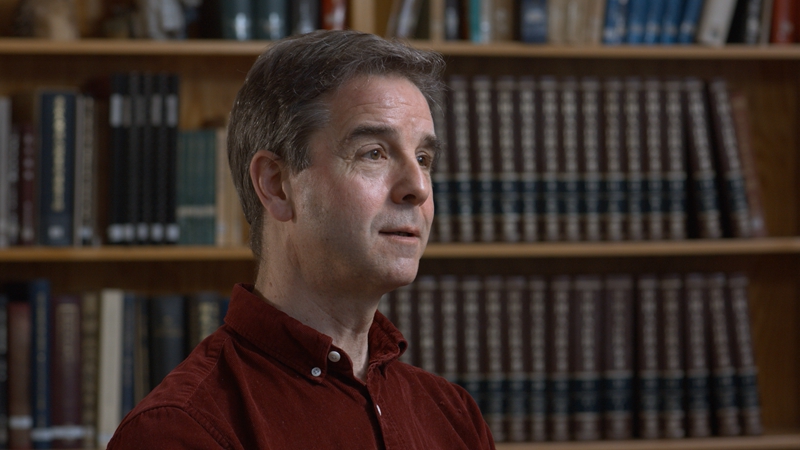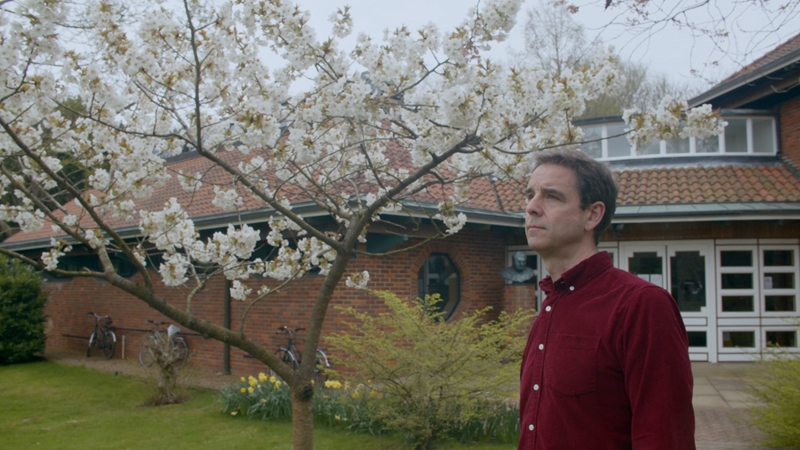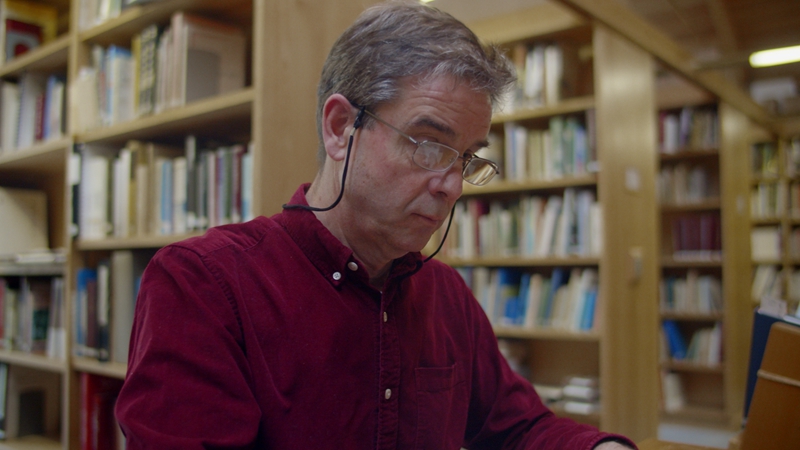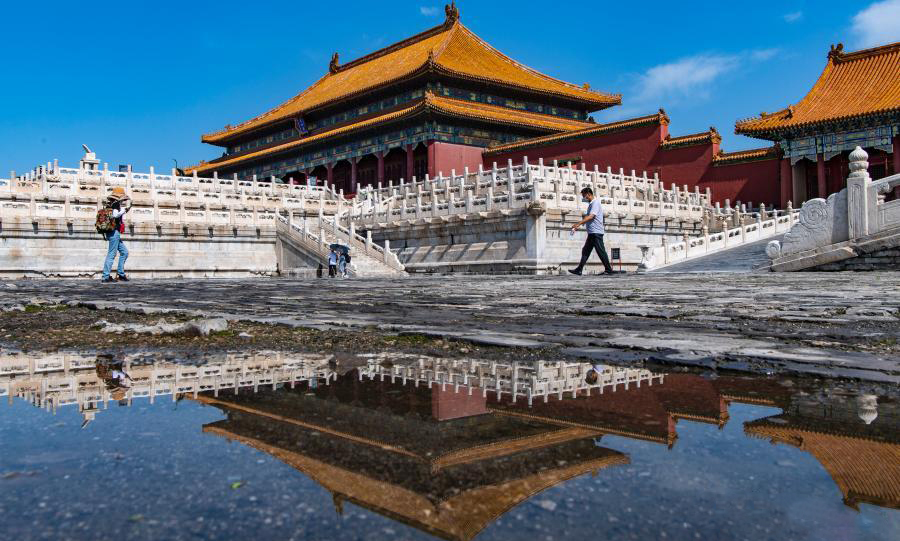John Moffett: Everlasting stewardship for generations of scholars
For scholars around the world, the Needham Research Institute in Cambridge has been a beacon of dedication to studies on the history of East Asian science. One man, John Moffett, as its librarian and the longest-serving employee, has worked with Dr. Joseph Needham, historian of science and author of Science and Technology of China, along with three generations of directors to create a lasting platform for visiting scholars from China and all around the world.
Moffett is also an experienced library professional. He has served or is serving on various library committees, such as the Cambridge University Library Automation Group. Alongside Prof. Chen Zhenghong of Fudan University, Moffett co-authored An Illustrated Catalogue of a Selection of Rare Books Written in Chinese Stored in the East Asian History of Science Library (Needham Research Institute, Cambridge, UK, 2020).
Currently, Moffett is working on a research project supported by the Wellcome Foundation to digitize the archival materials – including notes, diaries, and photos – associated with Dr. Joseph and Dorothy Needham’s trips to China during the Second World War.

John Moffett (Photo/Fraser Watson)
A Life-long pursuit of China studies
People’s Daily Online: Many foreigners spent some time as exchange students in China in the 1980s, including you. What do you remember the most from your experience then?
Moffett: I first went to China in September 1980 with a group of British undergraduate students, and then I went back after I graduated in 1982 and spent two years as an exchange student at Peking University. As that was coming to an end, I felt I wasn’t ready to go back to Britain yet. I wanted to spend more time in China.
I then started to work in the Foreign Language Press, translating and polishing materials that had already been translated. It was a wonderful experience. So most foreigners lived in a university or they lived in a hotel. But I was living in the middle of the city. There was a market outside my window. That gave me a great sense of freedom and of being really there.
People’s Daily Online: And what did you do after you came back to the UK and how did you end up working at the Needham Institute?
Moffett: I was up in Edinburgh, and I was, I must say, struggling with my PhD. Professor Ho Peng Yoke, who was the director of the Needham Research Institute at the time, came to give a talk. And, about a month later, I heard there was a job coming up at the Institute for the librarian.
So I came down for an interview and started working here in August 1992, and I was very fortunate that when I arrived, Dr. Needham was here. I remember as I walked in the door, like most people who walk in the door to this institute, I just went ‘Wow, this place is really lovely!’ And there was a really special atmosphere.
In 1992, the library housed Dr. Needham's private collection of books, journals and prints of articles since the 1930s. The book collection was probably about 30,000 volumes, of which more than half was in Chinese, and included about 700 traditional Chinese thread-bound books. In addition to notebooks, photographs and letters from the Needhams’ visits to China, we have other collections such as hundreds of paintings and calligraphy that accumulated through his life-long engagement with China.
People’s Daily Online: And what were your initial thoughts about your job?
Moffett: When I look back at it now, I very quickly realized there were three things that would be important for me in my job:
The first was to treat everyone who came here in the same way. I didn’t matter if they were a Nobel Prize winning professor or a school child being shown around, I should just treat them all with the same courtesy, helpfulness, and friendliness.
The second was despite the fact there was a very great deal of work to do, I was studying China, which is a civilization stretching back thousands of years. And Rome is not built in one day. So, my job was to carry on adding to the foundations of what one would hope would become an institute that would be here in 100 years.
The third thing I gradually realized was it was very important that our small independent research institute in the midst of Cambridge had a close relationship and adhered to many of the standards of the rest of the university.

John Moffett (Photo/Fraser Watson)
A lasting foundation for China-UK friendship
People’s Daily Online: Based on your first principle, I guess you must have a very close relationship with the visitors here?
Moffett: I have made so many friends, it’s really quite incredible. Normally, we'd have probably around 10 to 12 visiting scholars here, many of whom would come from China but we also have one visiting fellowship that will allow us to bring scholars from the US.
What I remember more is the pleasure of sitting here, listening to the talks, and the way students’ eyes light up when you bring them a book that just arrived, and you know that’s really central to their work. And I've seen so many young scholars come here shy, anxious and go away confident and, you know, ready to write their books and educate generations of other students.
People’s Daily Online: And how about scholars outside the Needham Institute, do you have close relationships with some of them as well?
Moffett: Yes, that was another aspect that slowly dawned on me after I arrived here. Joseph Needham and those around him had an enormous network of connections around the world stretching right back to before the Second World War and that was important to his work. And I suddenly realized that as the only full-time member of the staff here in 1992, a lot of that responsibility was going to fall upon me.
So I needed to start building these connections, and I have been back to China every year since 1995, except for the year of 2008 when my son was born. What I would do in China are three main things: buy books – so I had lots of fun scouring the bookshops, going to conferences in order to network and find out the latest research, and I would visit institutions around China that carried out research on the history of science and all other topics related to the work of our institute. Initially there very few of them, but the developments in the history of science in China and the ways it has expanded is extraordinary.
People’s Daily Online: Having witnessed the development of the history of science in China, is the institute seeking any collaboration with Chinese partners?
Moffett: Prior to the pandemic, we just finished the collaboration with Professor Chen Zhenghong from Shanghai, who produced a catalogue of about 100 of the items in our collection of traditional Chinese thread-bound books.
There is another collaboration I would like to pursue. In the last two and a half years, we’ve had a grant from the Welcome Trust in London to digitize, transcribe, and catalogue a lot of the material relating to the visits by Dr. Needham and his wife, Dr. Dorothy Moyle Needham to China from the Second World War. These include diaries, notebooks, letters and of course lots of photographs.
And what I'd very much love to do and hope to do in the future would be collaborate with scholars, particularly at the Chinese Academy of Sciences and to see whether we could get permission to see the archives and get into the archives there to look at how the Needhams and the Needhams’ visits to China were viewed from the Chinese perspective.

John Moffett (Photo/Fraser Watson)
A thriving platform for scholarly exchange
People’s Daily Online: Speaking of Dr. Needham’s trips to China, many of our readers – myself included – are probably wondering the same thing: what about the Needham Question?
Moffett: With regard to the Needham Question. I think the first important thing is that that was a question from 70 years ago. It's a very interesting question and has proven extremely useful up until today to arouse the interest of, and particularly, students. As soon as you raised this issue of why did the Industrial Revolution and modern science develop in Northern Europe and not somewhere like China, with all its extraordinary cultural and technological developments and wealth, students will come up with all sorts of fascinating ideas.
But academia has moved on and the ways in which academics view culture and science is radically different from Needham's time. Scholars now are primarily interested in what did science and technology mean – what is science, what is technology, and especially what is the relationship with these objects and these cultural artifacts in each culture around the world. So, scholars of China now will be looking at what was the role of what we think of as technology or science today throughout different periods in different parts of China. Not why did something not happen, but what was happening.
People’s Daily Online: As you said, it has been decades since Dr. Needham asked that famous question. Now that much of his work has also been published, what do you consider to be the next step for the Needham Institute?
Moffett: I think the most important thing for a small institute like ours sitting next door to a very large institution like Cambridge University is to establish what the Chinese call “Dingwei” – a right position. Asking the question: what it is we do that is special and different?
And whilst Dr. Needham was here physically working on the science and civilization of China project with his collaborators and scholars around, that was their function and purpose over the past 20 years. We've now developed more into serving as a platform. We are a platform here for visiting scholars to come conduct their research and engage with scholars from all sorts of other countries and around Cambridge and all sorts of other disciplines.
Our visiting scholars all have their own very distinctive research traditions. And this important mixture produces the most value for the visitors coming here. And I hope we will carry on being this extremely important conduit – a non-political conduit just based on a common respect and enjoyment in of Chinese culture that every visitor here shares.
Today it is absolutely essential that Britain has the capacity, the knowledge, and the people who know Chinese well – both classical and modern – to respect and admire its culture. It's so important that the British people understand much more about the history and culture of China – what it means to be Chinese and what it means to be British – to look at and engage with China. Being this conduit of contact between China and the UK was such an important part of Dr. Needham's life and will be so for many, many decades to come.
People’s Daily Online: You started working at the institute in 1992 and this year marks the 30th anniversary. As the longest-serving employee, what’s on your mind when you look back at your career here?
Moffett: Well, I think when I came here, the institute was a fledgling institute. The building was completed in 1980s, and Dr. Needham moved in to work here in late 1986. Now it's been nearly 30 years and we have managed to establish this institute as a well-known institute for research on the history of science in East Asia across the world.
When I look back, of course I wonder where has all that time gone? But I also look at it with an enormous amount of pleasure. I have to say, the visitors here, the people I've worked with, the people around Cambridge who've worked with me, have just given me so much support and made my job so incredibly satisfying and enjoyable – more than I could ever have hoped for.
In the way in which libraries work, in the way in which academia works, and in terms of relationships with China in all these areas, all I can say is I just feel extraordinarily lucky that I was given this opportunity. And I just hope that those who come after me will have as much fun, as much satisfaction and learn as much as I have through doing this job.
Photos
Related Stories
Copyright © 2022 People's Daily Online. All Rights Reserved.









